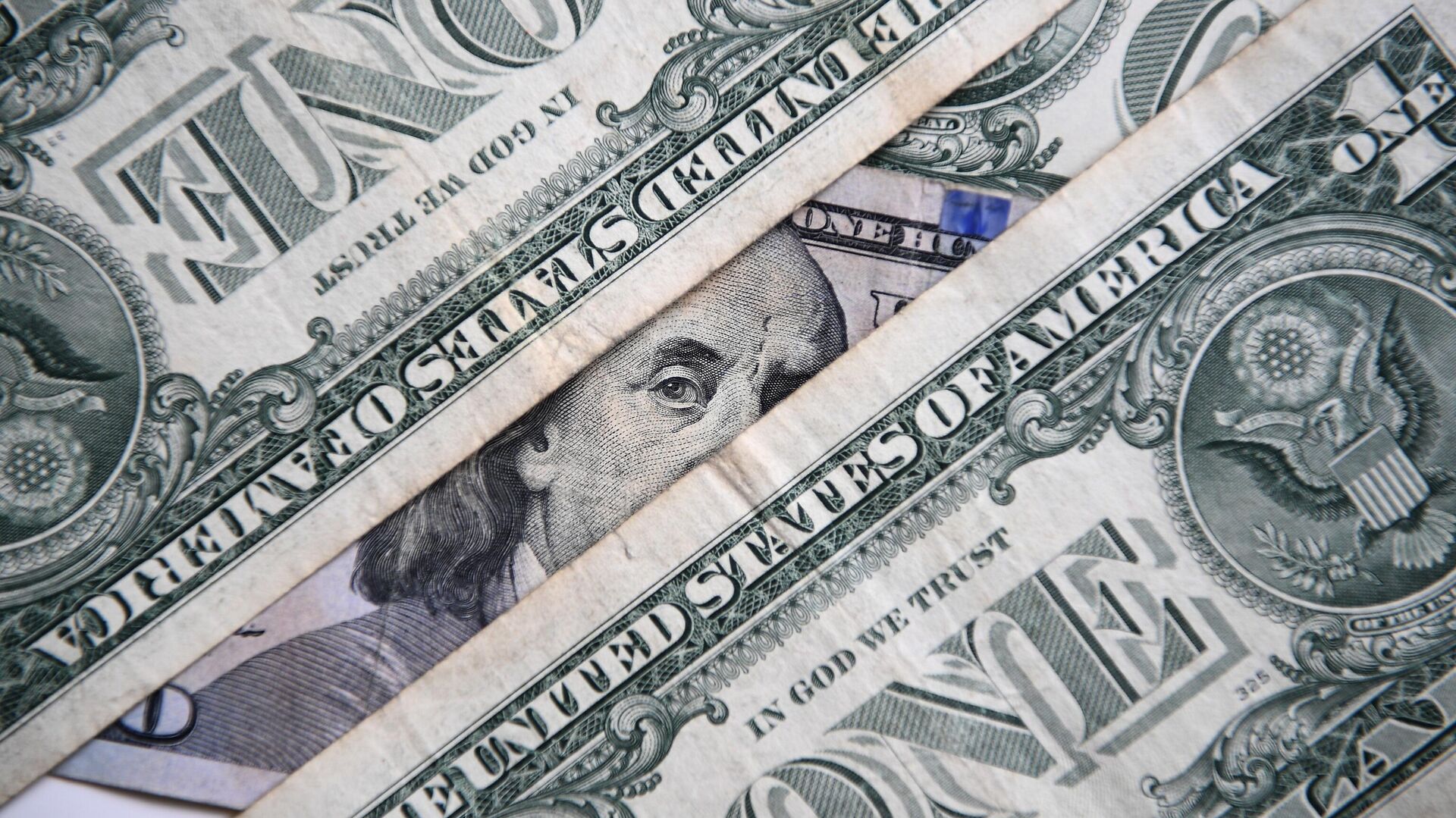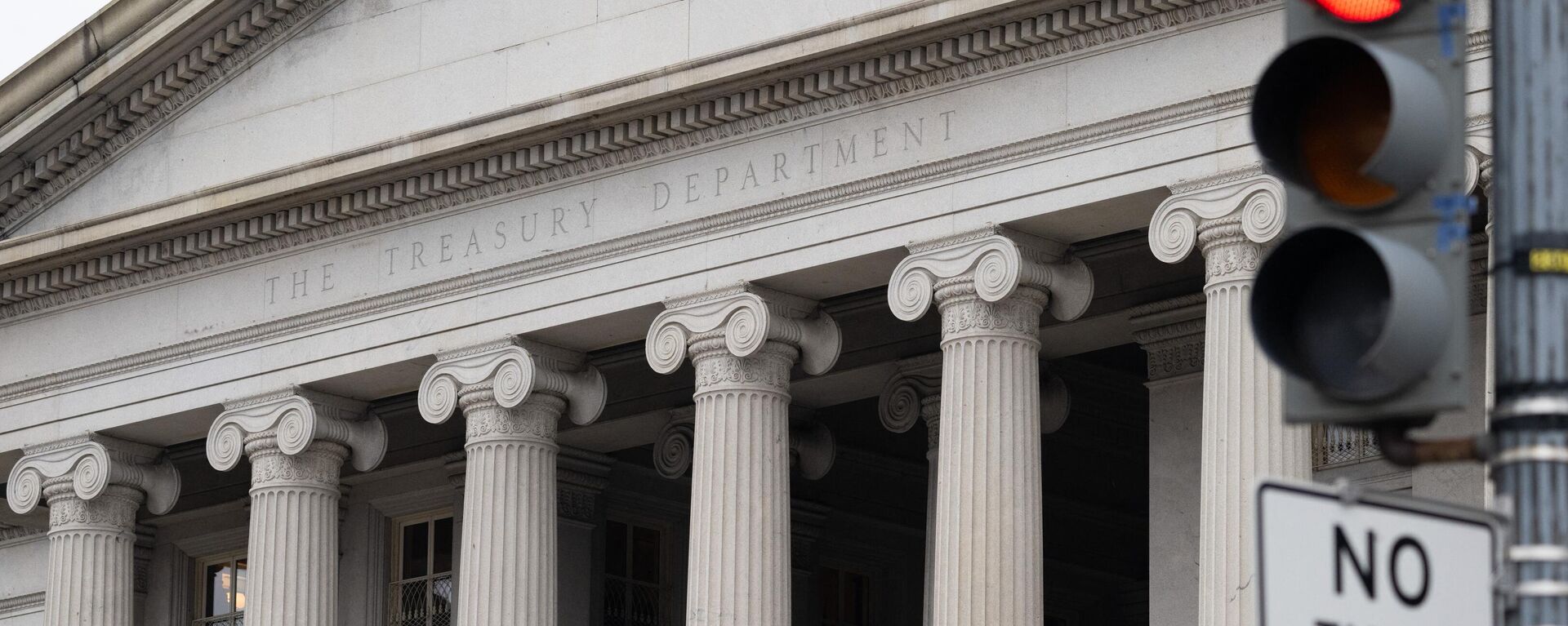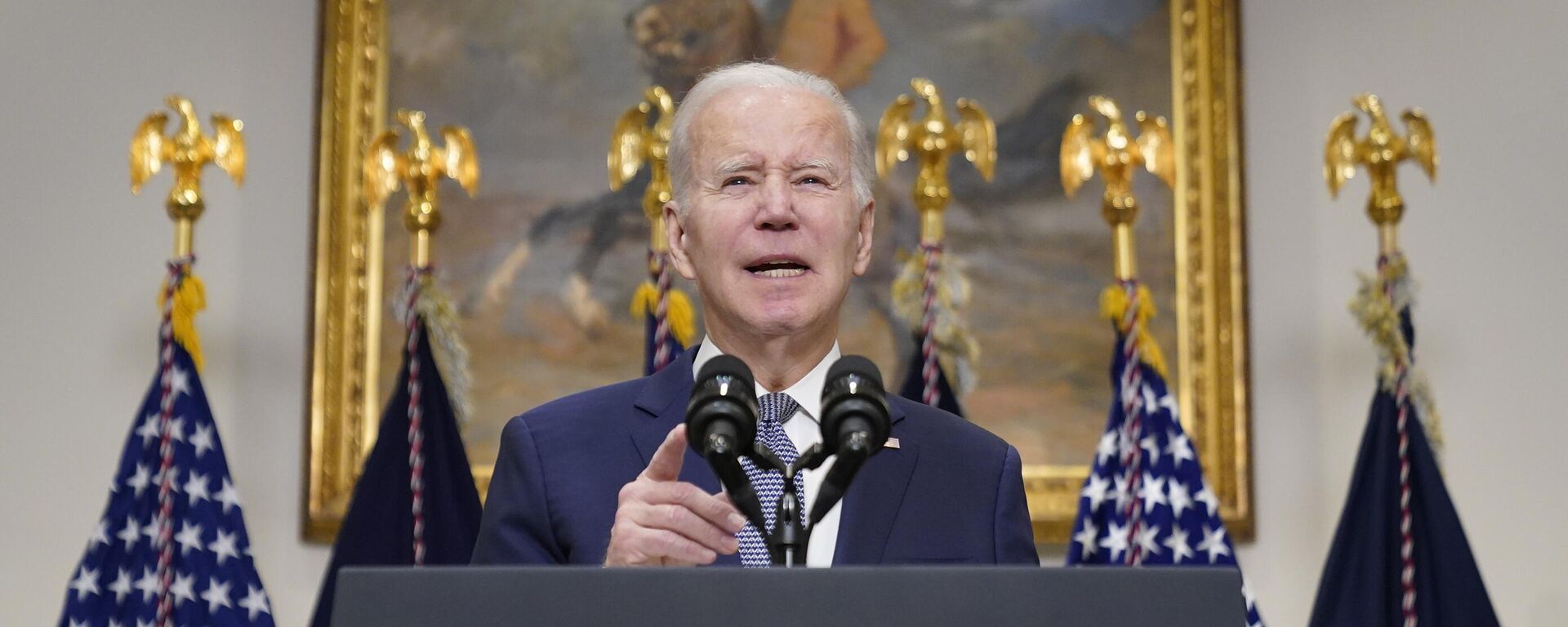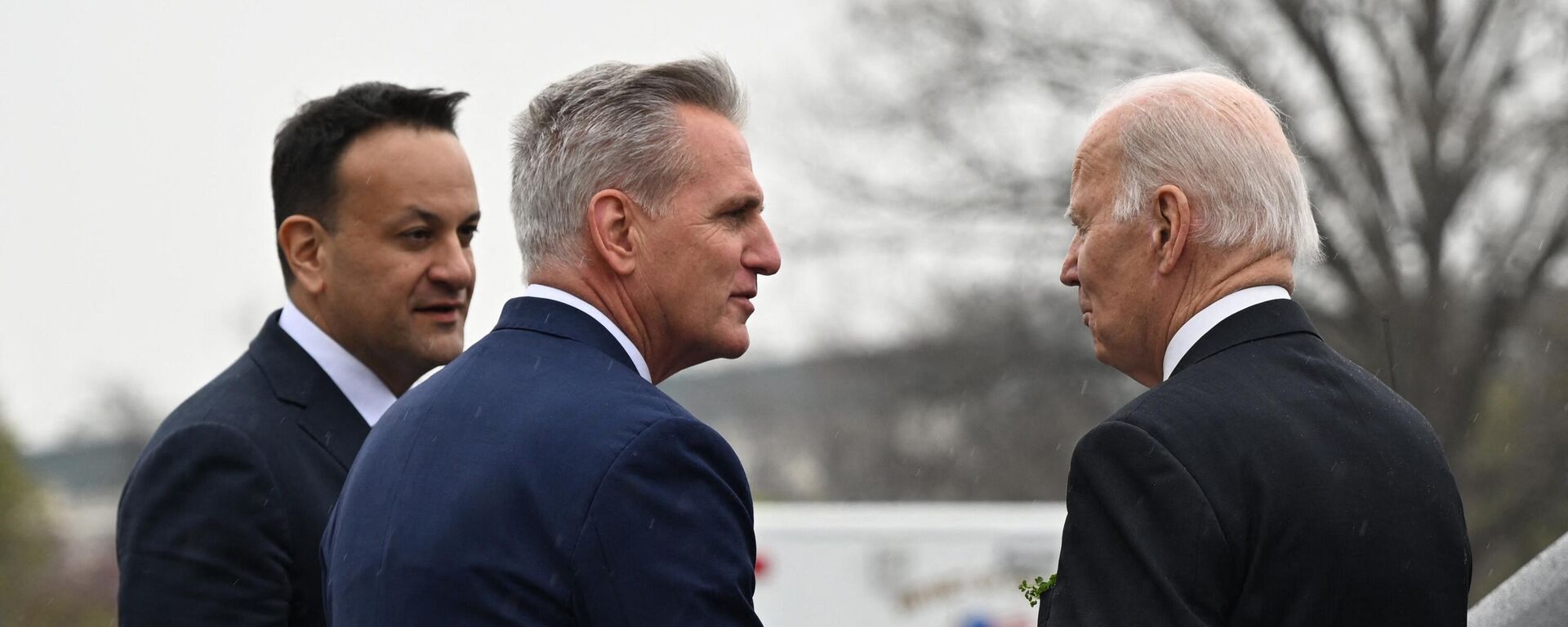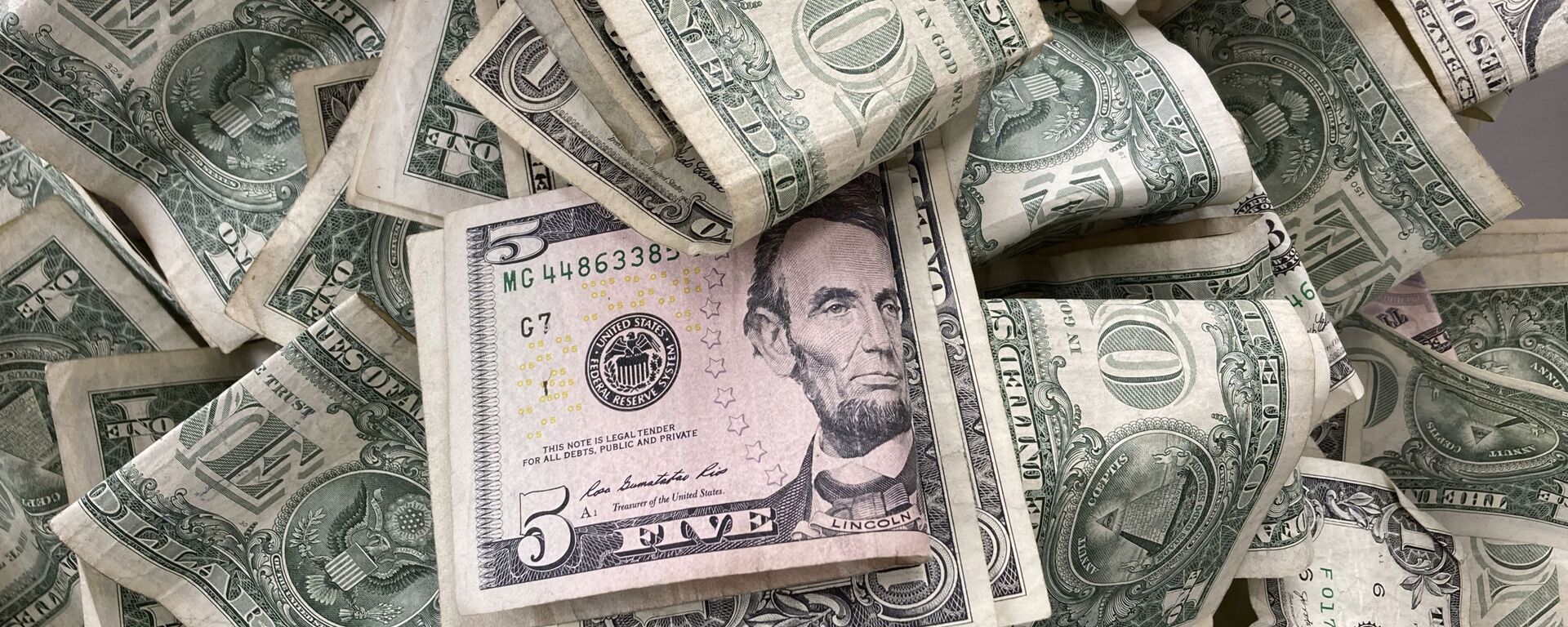https://sputnikglobe.com/20230529/why-debt-ceiling-deal-doesnt-mean-us-economy-out-of-woods-1110778935.html
Why Debt Ceiling Deal Doesn't Mean US Economy Out of Woods
Why Debt Ceiling Deal Doesn't Mean US Economy Out of Woods
Sputnik International
Following heated debates US President Joe Biden and House Republican Speaker Kevin McCarthy have reached a final agreement to suspend the $31.4 trillion debt limit through January 1, 2025. What's in the deal and how would it affect the US economy?
2023-05-29T18:39+0000
2023-05-29T18:39+0000
2023-05-29T18:39+0000
analysis
opinion
joe biden
china
republicans
democrats
internal revenue service (irs)
us
us treasury
debt ceiling
https://cdn1.img.sputnikglobe.com/img/07e6/08/0f/1099623349_0:161:3071:1888_1920x0_80_0_0_a52b2252236220ed82364d4ace1f254a.jpg
"This deal does not surprise me, as a debt default of the US government would give rise to a major financial crisis across the global economy," Sergio Rossi, professor of macroeconomics and monetary economics at the University of Fribourg, Switzerland, told Sputnik. Neither Democrats nor Republicans in the United States could afford such a situation to occur. It was therefore sure that a compromise between them was going to be announced before long, so that the debt ceiling was going to be either suspended or pushed up once again."Rossi explained that suspending the debt ceiling for two years in the United States means that the US federal government must not respect such a ceiling during this period, even though this does not mean there is no budget constraint for the US administration.What's in the Deal?The deal meets a number of the Republicans' demands. First, non-defense spending has been capped at about $637 billion, meaning that it will remain at the same level as the previous year.Second, a $1.39 billion portion of a staggering $80 billion package for the Internal Revenue Service (IRS) under the Inflation Reduction Act will also be slashed; an additional $20 billion in appropriations funding to the agency will be repurposed during 2024 and 2025.Third, around $35 billion in unspent COVID relief funds will be rescinded, while $400 million will be cut from the Centers for Disease Control (CDC) global health fund. Medicaid health insurance will see no changes.Fourth, Biden's student loan cancellation program will remain intact, but nonetheless go to the Supreme Court for further examination.Fifth, the deal tightens requirements for receiving Supplemental Nutrition Assistance Program (SNAP), commonly known as "food stamps" and Temporary Assistance for Needy Families (TANF). While families with children, homeless and veterans will see no changes in the programs, single people without children up to 54 years old will have to meet stricter requirements to continue receiving the aid and shorter periods for getting it.Sixth: the nation's defense spending will see an increase of approximately 3.5% nonetheless. Thus, the Pentagon is set to receive $886 billion in fiscal year 2024.The deal has met bipartisan criticism. The Republicans argued that the Biden-McCarthy agreement fell short of meeting the requirements of the Limit, Save, Grow Act, passed by the House GOP earlier this year. Democrats and 100-member House Progressive Caucus fumed over social spending cuts.Team Biden Has Not Managed to Avoid Recession YetDespite the debt ceiling deal ruling out an imminent default scenario for the US, it does not mean that the American economy is out of the woods, continued the professor.The economist believes that "the US financial system is highly fragile and unstable, particularly in connection to those medium-sized banks that have an increasing volume of non-performing loans, as a result of some regional banks having gone bankrupt recently." He referred to the latest takeover of three US regional banks by the government. The collapse of the banks triggered concerns about a potential domino effect, with studies claiming that at least 200 US lenders are now at risk.Rossi projected that both the real economy and the financial sector in the US could soon experience a "period of stagflation, if not recession, coupled with different increases in the consumer price level." This situation is exacerbated by geopolitical tensions in Europe and a US-China spat over Taiwan fanned on by the Biden administration.Another troubling factor is de-dollarization, which is gradually gaining pace. Even though it does not mean an imminent collapse of the greenback, the trend shows that the role of the US dollar as a dominant reserve currency is waning. This will considerably limit Washington's room for maneuver.
https://sputnikglobe.com/20230529/proposed-us-debt-ceiling-deal-to-include-spending-caps-changes-to-welfare-requirements-1110775984.html
https://sputnikglobe.com/20230528/biden-says-budget-agreement-represents-compromise-not-everyone-gets-what-they-want-1110646504.html
https://sputnikglobe.com/20230529/text-of-us-biden-mccarthy-debt-ceiling-deal-bill-released-1110758898.html
https://sputnikglobe.com/20230528/dc-scholars-realize-de-dollarization-trend-unstoppable-1110755346.html
china
Sputnik International
feedback@sputniknews.com
+74956456601
MIA „Rossiya Segodnya“
2023
News
en_EN
Sputnik International
feedback@sputniknews.com
+74956456601
MIA „Rossiya Segodnya“
Sputnik International
feedback@sputniknews.com
+74956456601
MIA „Rossiya Segodnya“
us debt ceiling, us debt ceiling deal, joe biden, kevin mccarthy, bipartisan criticism of debt ceiling deal, supplemental nutrition assistance program, food stamps, limit save grow act, increased us defense budget, us recession, us banking crisis, dedollarization, us stagflation
us debt ceiling, us debt ceiling deal, joe biden, kevin mccarthy, bipartisan criticism of debt ceiling deal, supplemental nutrition assistance program, food stamps, limit save grow act, increased us defense budget, us recession, us banking crisis, dedollarization, us stagflation
Why Debt Ceiling Deal Doesn't Mean US Economy Out of Woods
Following heated debates, US President Joe Biden and House Republican Speaker Kevin McCarthy have reached a final agreement to suspend the $31.4 trillion debt limit through January 1, 2025. What's in the deal and how will it affect the US economy?
"This deal does not surprise me, as a debt default of the US government would give rise to a major financial crisis across the global economy," Sergio Rossi, professor of macroeconomics and monetary economics at the University of Fribourg, Switzerland, told Sputnik. Neither Democrats nor Republicans in the United States could afford such a situation to occur. It was therefore sure that a compromise between them was going to be announced before long, so that the debt ceiling was going to be either suspended or pushed up once again."
Rossi explained that suspending the debt ceiling for two years in the United States means that the US federal government must not respect such a ceiling during this period, even though this does not mean there is no budget constraint for the US administration.
"It simply means that the US Federal Reserve, that is, the national central bank, will finance any further public debt with monetary policy interventions, continuing purchasing US government bonds on the primary market, where these bonds are issued by the US federal government with different maturities, to finance its fiscal deficits in 2023 and 2024," he said. "This monetization of the public debt is possible as a result of the US dollar being a major reference currency in the global economy, where an important share of foreign trade and financial transactions are denominated in this currency."
The deal meets
a number of the Republicans' demands.
First, non-defense spending has been capped at about $637 billion, meaning that it will remain at the same level as the previous year.
Second, a $1.39 billion portion of a staggering $80 billion package for the Internal Revenue Service (IRS) under the Inflation Reduction Act will also be slashed; an additional $20 billion in appropriations funding to the agency will be repurposed during 2024 and 2025.
Third, around $35 billion in unspent COVID relief funds will be rescinded, while $400 million will be cut from the Centers for Disease Control (CDC) global health fund. Medicaid health insurance will see no changes.
Fourth, Biden's student loan cancellation program will remain intact, but nonetheless go to the Supreme Court for further examination.
Fifth, the deal tightens requirements for receiving Supplemental Nutrition Assistance Program (SNAP), commonly known as "food stamps" and Temporary Assistance for Needy Families (TANF). While families with children, homeless and veterans will see no changes in the programs, single people without children up to 54 years old will have to meet stricter requirements to continue receiving the aid and shorter periods for getting it.
Sixth: the nation's defense spending will see an increase of approximately 3.5% nonetheless. Thus, the Pentagon is set to receive $886 billion in fiscal year 2024.
The deal has met bipartisan criticism. The Republicans argued that the Biden-McCarthy agreement fell short of meeting the requirements of the Limit, Save, Grow Act, passed by the House GOP earlier this year. Democrats and 100-member House Progressive Caucus
fumed over social spending cuts.
"No one got everything they want. But that’s the responsibility of governing," Biden told reporters on Sunday. "It takes the threat of catastrophic default off the table." The agreement now goes to the House and to the Senate.
Team Biden Has Not Managed to Avoid Recession Yet
Despite the debt ceiling deal ruling out an
imminent default scenario for the US, it does not mean that the American economy is out of the woods, continued the professor.
"The perspectives for the US economy are not encouraging for firms and investors, because of a number of open issues that still remain to be addressed and resolved, on both economic and geopolitical grounds," said Rossi. "The domestic economy has been suffering since the 2006 subprime crisis, which became a global financial crisis in 2008 after the demise of the US investment bank Lehman Brothers. Further, the Covid-19 pandemic crisis has also affected the domestic and global economy negatively, both of which are currently suffering from an energy crisis."
The economist believes that "the US financial system is highly fragile and unstable, particularly in connection to those medium-sized banks that have an increasing volume of non-performing loans, as a result of some regional banks having gone bankrupt recently." He referred to the latest takeover of three US regional banks by the government. The collapse of the banks triggered concerns about a potential domino effect, with studies claiming that at least 200 US lenders are now at risk.
Rossi projected that both the real economy and the financial sector in the US could soon experience a "period of stagflation, if not recession, coupled with different increases in the consumer price level." This situation is exacerbated by geopolitical tensions in Europe and a US-China spat over Taiwan fanned on by the Biden administration.
Another troubling factor is
de-dollarization, which is gradually gaining pace. Even though it does not mean an imminent collapse of the greenback, the trend shows that the role of the US dollar as a dominant reserve currency is waning. This will considerably limit Washington's room for maneuver.
"The Biden Administration has not managed to avoid a recession yet," warned Rossi. "It has succeeded so far in avoiding that a major banking crisis occurs in the United States, thereby affecting also the global economy, but the worse has yet to come, particularly with respect to those households that are going to lose their subsides because of the US government decisions to cut a number of social benefits and tax credits for clean energies. The negative spiral that already exists as a result of different economic and financial issues is going to be aggravated thereby. There is also a major issue concerning foreign trade and financial flows, which are going to be much reduced by the ongoing de-dollarization of them by an increasing number of countries, both in Asia and Latin America."
